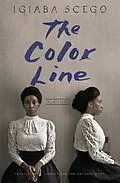Inspired by true events, this gorgeous, haunting novel intertwines the lives of two Black female artists more than a century apart, both outsiders in Italy.
It was the middle of the nineteenth century when Lafanu Brown audaciously decided to become an artist. In the wake of the American Civil War, life was especially tough for Black women, but she didn't let that stop her. The daughter of a Native American woman and an African-Haitian man, Lafanu had the rare opportunity to study, travel, and follow her dreams, thanks to her indomitable spirit, but not without facing intolerance and violence. Now, in 1887, living in Rome as one of the city's most established painters, she is ready to tell her fiancé about her difficult life, which began in a poor family forty years earlier.
In 2019, an Italian art curator of Somali origin is desperately trying to bring to Europe her younger cousin, who is only sixteen and has already tried to reach Italy on a long, treacherous journey. While organizing an art exhibition that will combine the paintings of Lafanu Brown with the artworks of young migrants, the curator becomes more and more obsessed with the life and secrets of the nineteenth-century painter.
Weaving together these two vibrant voices, Igiaba Scego has crafted a powerful exploration of what it means to be "other," to be a woman, and particularly a Black woman, in a foreign country, yesterday and today.
Autorentext
Igiaba Scego was born in Rome in 1974 to a family of Somali ancestry. She holds a PhD in education on postcolonial subjects and has done extensive academic work in Italy and around the world. Her memoir La mia casa è dove sono won Italy's prestigious Mondello Prize. She is a frequent contributor to the magazine Internazionale and to Il Venerdì di Repubblica, a supplement to La Repubblica.
John Cullen was the translator of many books from Spanish, French, German, and Italian, including Siegfried Lenz's The Turncoat, Juli Zeh's Empty Hearts, Patrick Modiano's Villa Triste, Kamel Daoud's The Meursault Investigation, and Philippe Claudel's Brodeck.
Gregory Conti has translated numerous works of fiction, nonfiction, and poetry from Italian including works by Emilio Lussu, Rosetta Loy, Elisa Biagini, and Paolo Rumiz. He is a regular contributor to the literary quarterly Raritan.
Klappentext
Inspired by a true story, this gorgeous, haunting novel intertwines the lives of two Black, female artists more than a century apart, both outsiders in Italy.
It was the middle of the nineteenth century when Lafanu Brown audaciously decided to become an artist. In the wake of the American Civil War, life was especially tough for black women, but she didn't let that stop her. The daughter of a Chippewa woman and an African-Haitian man, Lafanu had the rare opportunity to study, travel, and follow her dreams, thanks to her indomitable spirit, but not without facing intolerance and violence. Now, in 1887, living in Rome as one of the city's most established painters, she is ready to tell her fiancé about her difficult life, which began in a poor family forty years earlier.
In 2019, a young Italian art curator of Somali origins is desperately trying to bring to Europe her younger cousin, who is only sixteen and already tried to reach Italy on a long, treacherous journey. While organizing an art exhibition that will combine the paintings of Lafanu Brown with the artworks of young migrants, she becomes more and more obsessed with the life and secrets of the nineteenth-century painter.
Weaving together these two vibrant voices, Igiaba Scego has crafted a powerful exploration of what it means to be a woman, and particularly a Black woman, in a foreign country, yesterday and today.
